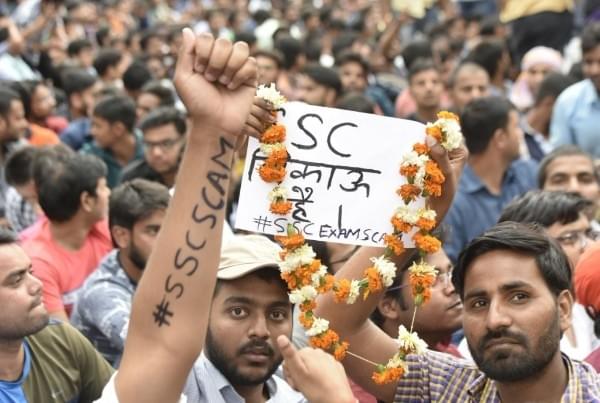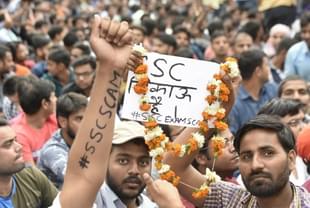Ideas
What SSC Aspirants Need Are These Long-Term Solutions
Tushar Gupta
Mar 06, 2018, 03:06 PM | Updated 03:06 PM IST
Save & read from anywhere!
Bookmark stories for easy access on any device or the Swarajya app.


On the morning of 21 February, less than 15 minutes into the Staff Service Commission Combined Graduate Level (SSC-CGL) Tier-2 exam, an instance of paper leak was reported. This was not the first such instance, for similar incidents had been reported over the last six years. The answer keys were available online on Facebook pages and groups relevant to the exam, an hour before its commencement, leaving candidates baffled.
The exam was conducted again, two hours later, with SSC attributing the cancellation and subsequent rescheduling to a technical glitch. However, the damage had been done.
The SSC, a body under the Government of India, conducts exams for various non-gazetted posts under the central government. These include lower division clerks, inspectors in the Excise and Income Tax Departments, and sub-inspectors in police and other law enforcement agencies. Lured by the comfort and stability the job prospects offer, on an average, over two million students appear for various exams conducted under the SSC. With rising unemployment and stagnation in the information technology (IT) industry, even engineering graduates have been taking the SSC exams, given that the payout is significantly better than what IT companies are willing to offer these days.
With the number of aspirants increasing to three million from a little over one million in the last few years, scalability has become an issue that the SSC has found difficult to combat. Moving the exam online in 2015 after reports of paper leaks and OMR (optical mark recognition) tampering in the conventional offline process, the SSC was expected to curb leaks that plagued its operational mechanisms. In what is an embarrassment, the SSC had to conduct Tier-1 and Tier-2 exams again in 2013 due to mass cheating, thus making an efficient and transparent digital exam process indispensable to sustain the faith of the aspirants in the system.
As students continue to protest in Delhi, it would be incorrect to say that the entire SSC exam system is compromised. Also, it would also be far from right to believe that the system is free of leakages. According to most student and exam portals, corruption levels in the SSC exam hover between 10 per cent and 20 per cent. The objective must be to bring it down to zero.
Taking into account the demands of the protesting aspirants, the SSC and the Union government must move beyond media trials, bureaucratic shenanigans, and paper leaks, to realistic solutions, for the faith of the students in the exam bodies must remain. For the anti-social elements who are looking to hijack the cause with doctored images, one can be rest assured that they will find something else to squander their time and attendance on.
Unlike before, the SSC must look for a long-term solution before this issue turns into a political football for people to play with. The protesting aspirants must be credited for they have ensured that their cause does not turn into a politicised drama for parties and student associations to draw momentum from, as the recently surfaced video of Jawaharlal Nehru University’s Shehla Rashid, wherein she is being asked to leave the protest venue, reveals.
First things first, an independent Central Bureau of Investigation (CBI) enquiry, which was one of the main demands of the protesting students, is not going to suffice, for it will only be constrained to the exams conducted during 17-22 February. The SSC must realise that a band-aid cannot cure a sword wound, and the CBI must be involved to clean up the house, not just a part of it. Ideally, these enquiries should have been sanctioned in 2013 itself, when the first instance of cheating was reported and papers had to be cancelled. Denial or not, the SSC officers must be questioned for postponing action for over a half-decade.
Operational cleansing of the exam framework must be complemented by planning for the longer term; or else political footballing in the form of irrational and irrelevant demands could follow. Already there are talks of demanding age relaxation and reservation among a few scattered groups.
The SSC must draw inspiration from Prime Minister Narendra Modi’s ‘Maximum Governance, Minimum Government’ ideal to combat the viruses that threaten to derail its system. However, it cannot do it all alone, for the mere scalability of exams it conducts facilitates these problems in the first place. When the exam was being conducted via OMRs, tampering of answer sheets had been reported. With the exam being moved online, there have been instances of remote access and question sets being leaked, adding to the distress of the aspirants. So, where does the buck stop?
First, the vendor must be changed. While we must wait for the results of the CBI enquiry to come out, there is no denying the fact that the current digital exam framework is susceptible to remote access and hacking. In the past, there have been reports of several students being selected from a single centre in Jaipur, which shows how vulnerable the employed platform is. The SSC must employ experts from the IT industry to choose the ideal vendor to facilitate the exam process in the future.
Second, the vendor must be changed periodically to ensure no dependency is created. With the lack of big players in the digital exam realm in India, it can get difficult for the SSC to invite applications for tenders or narrow down the final choice. This is where experts from the IT industry must be consulted regularly. Creating an exam framework free of glitches and immune to hacks could be difficult and delayed, but is surely not impossible for India given its strength in the IT sector.
However, if the vendor is unable to scale up their product to meet the growing aspirant numbers, the SSC could also consider having six to 10 vendors, designated according to the region, or randomly. Decentralising the digital framework will come with risks, but if the right vendors are chosen for the job, it could actually facilitate better, efficient management.
Third, the SSC must employ a team of test experts that conduct surprise checks at exam centres across the country. Often, students report the presence of rogue elements, compromised infrastructure, and lack of facilities, and so these surprise checks could also ensure accountability. The checks could be done discreetly by collaborating with local law enforcement agencies with an objective to ensure transparency, integrity, and efficiency in the process. Again, experts from the IT industry with expertise in the qualitative analysis could be chosen for the job on a contractual basis.
Fourth, the vendors, exam centres, and the contracted IT experts must be bound by a legal agreement supplemented with performance incentives and correction measures. As and when a compromise within the framework is discovered, reported, or proved by independent investigations, the license of the involved vendor, centres, or experts must be confiscated, thereby banning them from conducting or being part of any exam conducted by central, state, local, and private entities. Lack of accountability is what has put the SSC along with the thousands of aspirants in a soup, and it is time for the former to counter it strongly.
Eventually, these four metrics link directly back to infrastructure. For a country that is only beginning to discover the joy of rural electrification, broadband connectivity, IT infrastructure, and a stable internet connection are a luxury for most regions even today. With multiple reports of slow internet, system crashes, and power outages, some students end up suffering for no mistake of theirs. The SSC, hindered by its resources, ends up collaborating with some exam centres that are not ideally suited for an exam of this stature. There have been reports of some exam centres being without a drinking water facility too!
This year, SSC-CGL Tier-1 exam will be conducted across 129 centres in nine regions. While over 50 per cent of these centres can be safely assumed to be equipped with the threshold infrastructure, the SSC must focus on upgrading the remaining ones. From 2019, it must include clauses like number of labs required, number of computers in each lab, internet speed, server performance, and other relevant metrics to evaluate the exam centres, thus making the upgrade inevitable for lab owners. Not only will this ensure accountability, it will also add to infrastructural capacity. Facilities that do not house separate washrooms for boys and girls, or are without drinking water, for instance, must be isolated.
An alternate option exists in the public-private-partnership (PPP) model, where the SSC and University Grants Commission collaborate, and can seek help from over 300 private universities across India. With May to July being the off season in most private universities, the SSC can schedule certain sessions, especially the Tier-2 exams.
There should be something for the universities too, in this in the form of grants and higher ratings from the UGC, incentives for the invigilators, and an annual report where private universities are ranked on the basis of their infrastructure and efficiency. Given how effectively certain private universities conduct joint placement sessions for over 2,000 students in two to three days, the feasibility factor is not going to be a problem. The intricacies of scheduling can also be worked out between representatives of the respective universities and officials from the SSC.
In India, it is unfortunately normal for honest causes to be trampled under the political elephants, and the SSC protests are no different. Beyond the CBI enquiries, the SSC must assure aspirants that it will take significant measures to eliminate (not reduce) corruption in the current framework. For aspirants, it makes sense to focus more on their preparation than on the protests in the longer run.
Yes, the SSC is not without fault here, but a trial by media will do no good, and hence, the focus must be on these long-term solutions and not short-term footballing.
Tushar is a senior-sub-editor at Swarajya. He tweets at @Tushar15_





